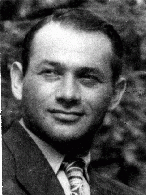You searched for: 聖馬力諾谷歌關鍵詞推廣【TG飞机:@bapingseo】INS,FACEBOOK全世界推广开户【TG电报:@bapingseo】谷歌收录哪里查【Telegram:@bapingseo】哪里有宝博体育官网app下载微笑棋牌4意甲买球软件下载足球世界杯在这个网址买外围?20220707y5HDFv.html
<< Previous | Displaying results 176-200 of 298 for "聖馬力諾谷歌關鍵詞推廣【TG飞机:@bapingseo】INS,FACEBOOK全世界推广开户【TG电报:@bapingseo】谷歌收录哪里查【Telegram:@bapingseo】哪里有宝博体育官网app下载微笑棋牌4意甲买球软件下载足球世界杯在这个网址买外围?20220707y5HDFv.html" | Next >>
-
The SA
ArticleThe SA (Sturmabteilung) was a paramilitary organization integral to Hitler’s ascension to power. Learn more about the rise and fall of the SA.
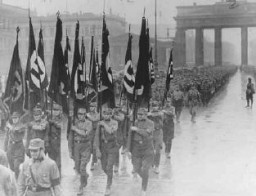
-
George Kadish
ArticleAt great risk, George Kadish secretly documented life in the Kovno ghetto in Lithuania, creating a key photographic record of ghetto life during the Holocaust.
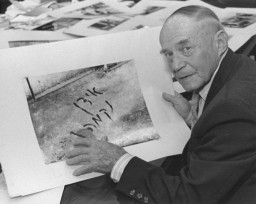
-
Operation Harvest Festival
Timeline EventNovember 3, 1943. On this date, SS and police units implemented "Operation Harvest Festival" (also known as Aktion Erntefest).

-
Page from Otto Wolf's Diary
Timeline EventApril 17, 1945. On this date, Felicitas Wolf wrote her first entry in her brother Otto's diary after his disappearance.
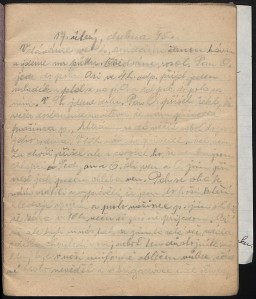
-
Pogroms
ArticleThe term “pogrom” historically refers to violent attacks on Jews by local non-Jewish populations. Learn about pogroms before, during, and after the Holocaust.
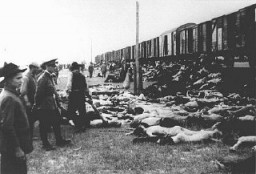
-
Mittelbau Main Camp: In Depth
ArticleLearn about conditions and forced labor in Dora-Mittelbau, the center of an extensive network of forced-labor camps for the production of V-2 missiles and other weapons.
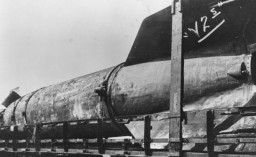
-
Gerda Blachmann Wilchfort describes the mood of passengers on the "St. Louis" after they were denied entry into Cuba
Oral HistoryGerda and her parents obtained visas to sail to Cuba on the "St. Louis" in May 1939. When the ship arrived in Havana harbor, most of the refugees were denied entry and the ship had to return to Europe. Gerda and her parents disembarked in Belgium. In May 1940, Germany attacked Belgium. Gerda and her mother escaped to Switzerland. After the war, they were told that Gerda's father had died during deportation.
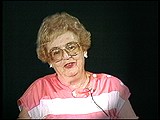
-
The United States and the Holocaust, 1942–45
ArticleWhy did the United States go to war? What did Americans know about the “Final Solution”? How did Americans respond to news about the Holocaust? Learn more.
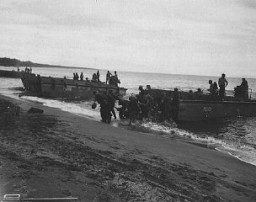
-
Kristallnacht
ArticleOn November 9–10, 1938, the Nazi regime coordinated a wave of antisemitic violence. This became known as Kristallnacht or the "Night of Broken Glass." Learn more
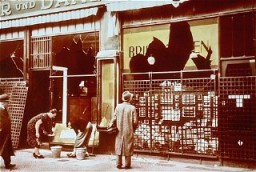
-
Katzenberger Case, March 13, 1942
ArticleThe Nuremberg Special Court ruled on the Katzenberger Race Defilement Case in 1942. Learn more about the outcome and impact of the case.
-
Yitzhak (Irving) Balsam
ID CardYitzhak was the second of four children born to religious Jewish parents. The family lived on the Polish-German border in Praszka, a small town where Yitzhak's father worked as a tailor. His work was not steady, and the family struggled to make ends meet. Yitzhak attended Polish public school in the mornings and Hebrew school in the afternoons. 1933-39: At 4 a.m. on September 1, 1939, the Balsams were awakened by an explosion. The Polish army had blown up the bridge over the Prosna River to impede the…
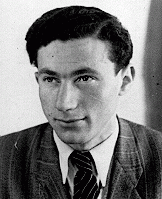
-
Bella Jakubowicz
ID CardBella was the oldest of four children born to a Jewish family in the small city of Sosnowiec, in Polish Silesia. Her father owned a successful knitting factory. In 1938, when she was 12, Bella began attending a private secondary school. 1933-39: When Bella's family returned from vacation in late August 1939, there were rumors of war. Her mother tried to stock up on food but the stores were already out of staples. The Germans took Sosnowiec on September 4; two weeks later they interned all the Jewish men…
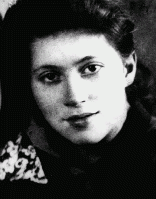
-
Aaron Lejzerowicz
ID CardAaron was one of four children born to a Jewish family in the northeastern Polish town of Zdzieciol. His father was a shoemaker and, along with a business partner, he also ran a shoe store in the town. Aaron attended a private Jewish school, where he studied the Polish language and history as well as Jewish history and Hebrew. 1933-39: On September 1, 1939, Germany invaded Poland. Three weeks later, Poland was partitioned between Germany and the Soviet Union [under the German-Soviet Pact]. Aaron and his…
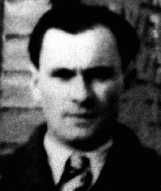
-
Paula Wajcman
ID CardPaula was raised in a religious Jewish family in Kielce, a city in the southeast of Poland. Her family lived in a modern two-story apartment complex. Paula's father owned the only trucking company in the district. Her older brother, Herman, attended religious school, while Paula attended public kindergarten in the morning and religious school in the afternoon. 1933-39: Paula's school uniform was a navy blazer with a white blouse and pleated skirt. At age 9, she did the "Krakowiak" dance at school. Boys…
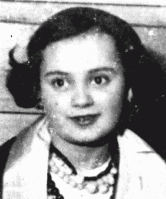
-
Gertrud Gruenbaum
ID CardBorn to a Jewish father and a Catholic mother, Gertrud grew up in Vienna. Trude, as she was affectionately called, attended a public secondary school, where half of her classmates were Jewish. At age 7 she rejected music lessons for classes in dancing and acting. Trude wanted to be like Greta Garbo. She launched an acting career at age 18, assuming the stage name Trude Hermann. 1933-39: Because Gertrud was Jewish she couldn't get acting jobs in Austria and nearby Sudetenland. In 1937 her agent found work…
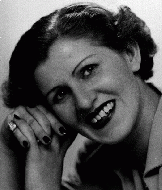
-
Andras Muhlrad
ID CardThe second of two children, Andras was born to Jewish parents living in a suburb of Budapest. His father was a pharmacist. The Muhlrads lived in a large house with Andras' grandfather and aunts. As a toddler, Andras often played with his older sister, Eva, and their cousins in the big yard behind their home. 1933-39: Andras was 4 when his family moved to their own apartment. It was 1936 when he began primary school and Hitler had already been in power in Nazi Germany for three years. At night his father…
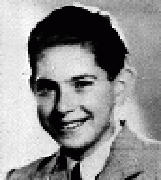
-
Helen Katz
ID CardThe youngest of eight children, Helen was born and raised in a religious Jewish family living in a town in northeastern Hungary. She was the "baby" of the family and the focus of everyone's hopes and affection. Although her Hebrew name was Hannah, her family called her by her nickname, Potyo, which meant "the dear little one." 1933-39: Helen liked school, but was afraid because some of the kids and teachers hated Jews. There was talk that there might be a war. Her mother wanted them to leave Hungary…
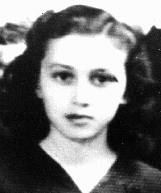
-
Hanandel Drobiarz
ID CardHanandel was raised with his three brothers and sisters in the town of Kozlow, where his family sold grain and livestock. The family was religious, and they observed the Sabbath and all Jewish holidays and dietary laws. When Hanandel was 5, he began studying Hebrew, the Bible, prayers, and Jewish history. 1933-39: At age 14 Hanandel was apprenticed to his uncle in Sosnowiec as a tinsmith. He worked for his uncle during the day and attended trade school at night. When he graduated from trade school he…
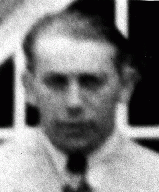
-
Shulamit Perlmutter (Charlene Schiff)
ID CardShulamit, known as Musia, was the youngest of two daughters born to a Jewish family in the town of Horochow, 50 miles northeast of Lvov. Her father was a philosophy professor who taught at the university in Lvov, and both of her parents were civic leaders in Horochow. Shulamit began her education with private tutors at the age of 4. 1933-39: In September 1939 Germany invaded Poland, and three weeks later the Soviet Union occupied eastern Poland, where Shulamit's town was located. Hordes of refugees…
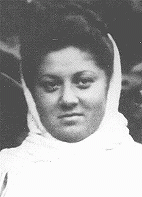
-
Vladan Popovic
ID CardVladan was the oldest of five children born to well-to-do Serbian Orthodox parents in the village of Gnjilane in the Serbian part of Yugoslavia. Vladan went to Montpelier, France, where he earned a law degree from the university. When Vladan returned to Yugoslavia, he worked as an attorney in Belgrade. He married and had one daughter. 1933-39: Vladan's wife died in 1933, and his 4-year-old daughter went to live with her maternal great-aunt. Meanwhile, Vladan had expanded his law practice and was…
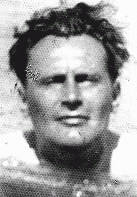
-
Hela Szabszevicz
ID CardHela was born in the industrial city of Lodz. She grew up speaking Polish and Yiddish, and learned German and Russian at secondary school. After completing school she married, and moved with her husband to a house on her father-in-law's large estate in the nearby town of Ozorkow. Hela was active in planning events for Jewish organizations. She and her husband, Israel, had two daughters. 1933-39: After German troops occupied Ozorkow in 1939, Hela and her family were forced out of their home and moved in…
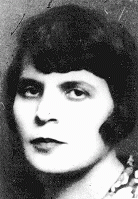
-
Rémy Dumoncel
ID CardRémy was born in a small French town to Catholic parents. In 1913, after studying law at the University of Paris, he joined the Tallandier publishing house in Paris. During World War I he served in the French army and was wounded five times. He returned to work at Tallandier after the war, and in 1919 he married Germaine Tallandier, the daughter of the owner. They had five children whom they raised as devout Catholics. 1933-39: In 1935 Rémy became the mayor of Avon, a small town about 35 miles southeast…
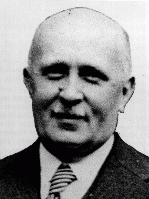
-
Adolphe Arnold
ID CardAdolphe was born to Catholic parents in Alsace when it was under German rule. He was orphaned at age 12, and was raised by his uncle who sent him to an art school in Mulhouse, where he specialized in design. He married in the village of Husseren-Wesserling in the southern part of Alsace, and in 1930 the couple had a baby daughter. In 1933 the Arnolds moved to the nearby city of Mulhouse. 1933-39: Adolphe worked in Mulhouse as an art consultant for one of France's biggest printing factories. When he wasn't…
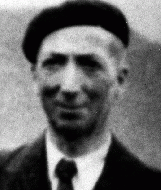
-
Wilek Loew
ID CardWilek was the son of Jewish parents living in Lvov, a large city in southeastern Poland. His family owned and operated a honeywine winery. Although they lived amongst Poles and Ukrainians, Wilek's family spoke Hebrew, German and Polish at home and were among Lvov's Jewish intelligentsia. When Wilek was 4, his father died of a heart attack. 1933-39: Jews were often discriminated against in Poland. They found it hard to gain access to schools and jobs. In 1939 Wilek managed to pass the entrance exam and…
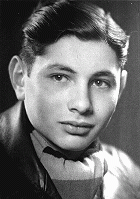
-
Mendel Rozenblit
ID CardMendel was one of six children born to a religious Jewish family. When Mendel was in his early 20s, he married and moved with his wife to her hometown of Wolomin, near Warsaw. One week after the Rozenblits' son, Avraham, was born, Mendel's wife died. Distraught after the death of his young wife and left to care for a baby, Mendel married his sister-in-law Perele. 1933-39: In Wolomin Mendel ran a lumber yard. In 1935 the Rozenblits had a daughter, Tovah. When Avraham and Tovah were school age, they began…
